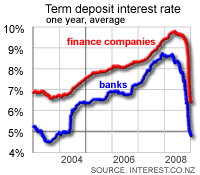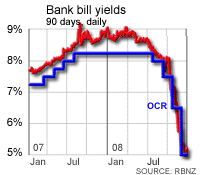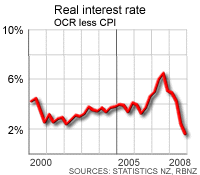 Investors are being threatened with negative real returns as banks' term deposit rates appear to be trending below 4% at the start of 2009. A number of wholesale rates such as 90 day bill rates and government bonds need to be watched as closely as the Official Cash Rate (OCR), as they are leading indicators as to where banks set their term deposit rates.
Since the Reserve Bank began cutting the OCR on July 24, 2008, term deposit rates have fallen by considerably more than inflation has fallen. CPI was 5.1%pa in the September quarter and is expected to be around 3.6%pa for the December quarter.
Counterring the benefits borrowers have gained from lowering the OCR, investors have suffered significant lower returns, which may turn negative soon on an inflation adjusted basis.
Even if the CPI remains below term deposit rates, investors often have more exposure to certain individual inflationary pressures, such as food price inflation, which was 10.8%pa in the September quarter.
Investors are being threatened with negative real returns as banks' term deposit rates appear to be trending below 4% at the start of 2009. A number of wholesale rates such as 90 day bill rates and government bonds need to be watched as closely as the Official Cash Rate (OCR), as they are leading indicators as to where banks set their term deposit rates.
Since the Reserve Bank began cutting the OCR on July 24, 2008, term deposit rates have fallen by considerably more than inflation has fallen. CPI was 5.1%pa in the September quarter and is expected to be around 3.6%pa for the December quarter.
Counterring the benefits borrowers have gained from lowering the OCR, investors have suffered significant lower returns, which may turn negative soon on an inflation adjusted basis.
Even if the CPI remains below term deposit rates, investors often have more exposure to certain individual inflationary pressures, such as food price inflation, which was 10.8%pa in the September quarter.
 Term deposit rates for investments of NZ$10,000+, as well as 90 day bank bills and government bond rates have all fallen considerably since the Reserve Bank began cutting the OCR by 25 basis points in July 2008. This was followed by a 50bp cut in September, 100 in October and 150 as recently as December 4.
The next OCR announcement from the Reserve Bank will be on January 29. Most economists are predicting the OCR to fall to 4% or lower by mid 2009.
Rates from RaboPlus have been an early market indicator for where term deposit rates are likely to end up as they appear to price rates closely off the wholesale benchmarks. It is currently offering 4% for its one year term deposit rates (all rates are at time of publishing).
New Zealand's major banks are still sitting higher than RaboPlus, but the trend is for further downward movement.
ANZ, National Bank and BNZ are offering 4.5% for a one year term deposit over NZ$10,000. Before the July OCR cut, ANZ was offering 8.3% for the same deposit; National 8.5%; and BNZ 7.9%. All have cut this rate by more than the 3.25% OCR reduction.
ASB and Westpac are sitting at the top of the list of major banks, with rates of 5.5% and 5.3% respectively for a one year deposit over NZ$10,000.
Term deposit rates for investments of NZ$10,000+, as well as 90 day bank bills and government bond rates have all fallen considerably since the Reserve Bank began cutting the OCR by 25 basis points in July 2008. This was followed by a 50bp cut in September, 100 in October and 150 as recently as December 4.
The next OCR announcement from the Reserve Bank will be on January 29. Most economists are predicting the OCR to fall to 4% or lower by mid 2009.
Rates from RaboPlus have been an early market indicator for where term deposit rates are likely to end up as they appear to price rates closely off the wholesale benchmarks. It is currently offering 4% for its one year term deposit rates (all rates are at time of publishing).
New Zealand's major banks are still sitting higher than RaboPlus, but the trend is for further downward movement.
ANZ, National Bank and BNZ are offering 4.5% for a one year term deposit over NZ$10,000. Before the July OCR cut, ANZ was offering 8.3% for the same deposit; National 8.5%; and BNZ 7.9%. All have cut this rate by more than the 3.25% OCR reduction.
ASB and Westpac are sitting at the top of the list of major banks, with rates of 5.5% and 5.3% respectively for a one year deposit over NZ$10,000.
 If the OCR does reach 4% by mid 2009 (a fall of 4.25% from July 2008), and the trend of banks cutting term deposit rates by more than the OCR reductions continues, term deposit rates are set to fall below 4%.
One major rate to watch is the 90 day bank bill rate, a key inter-bank funding rate. On January 5 (Monday) the rate fell below 5% for the first time since February 15, 2002. In March 2008, the 90 day bank bill rate reached its recent high at 9.06%. The day before the Reserve Bank began cutting the OCR (July 23), the rate was 8.43%. It has fallen by 3.49% while the OCR was cut by 3.25%.
Another key wholesale market reference rate is the one year government bond rate. This fell below 4% on the last day of 2008 for the first time since it appeared in the RBNZ series on June 25, 1987. On July 22, 2008, the rate was 7.03%. On January 5, 2009, it was 3.94%.
The smaller banks in New Zealand are still offering higher term deposit rates than the major ones but it still seems likely that they too will go sub-4% as the OCR reductions continue.
Kiwibank is offering (at time of publishing) a rate of 4.8% for a one year term deposit above NZ$10,000. In mid July it was offering 8.5%.
TSB is offering 5.25%, down from 8% before the OCR reductions began.
As term deposit rates converge with the inflation rate, the prospect of negative returns can be shown with a brief example:
In mid July 2008, a NZ$100,000 deposit at 8.5% returned NZ$5,695 after tax at 33%. Inflation then was 5.1% and cut NZ$5,100 off the interest earned, which left NZ$595 as the real return. If that same deposit is now locked in at 4%, with 3.6% inflation the real return would be negative NZ$920.
Capital is being eroded and real returns have disappeared.
If the OCR does reach 4% by mid 2009 (a fall of 4.25% from July 2008), and the trend of banks cutting term deposit rates by more than the OCR reductions continues, term deposit rates are set to fall below 4%.
One major rate to watch is the 90 day bank bill rate, a key inter-bank funding rate. On January 5 (Monday) the rate fell below 5% for the first time since February 15, 2002. In March 2008, the 90 day bank bill rate reached its recent high at 9.06%. The day before the Reserve Bank began cutting the OCR (July 23), the rate was 8.43%. It has fallen by 3.49% while the OCR was cut by 3.25%.
Another key wholesale market reference rate is the one year government bond rate. This fell below 4% on the last day of 2008 for the first time since it appeared in the RBNZ series on June 25, 1987. On July 22, 2008, the rate was 7.03%. On January 5, 2009, it was 3.94%.
The smaller banks in New Zealand are still offering higher term deposit rates than the major ones but it still seems likely that they too will go sub-4% as the OCR reductions continue.
Kiwibank is offering (at time of publishing) a rate of 4.8% for a one year term deposit above NZ$10,000. In mid July it was offering 8.5%.
TSB is offering 5.25%, down from 8% before the OCR reductions began.
As term deposit rates converge with the inflation rate, the prospect of negative returns can be shown with a brief example:
In mid July 2008, a NZ$100,000 deposit at 8.5% returned NZ$5,695 after tax at 33%. Inflation then was 5.1% and cut NZ$5,100 off the interest earned, which left NZ$595 as the real return. If that same deposit is now locked in at 4%, with 3.6% inflation the real return would be negative NZ$920.
Capital is being eroded and real returns have disappeared.
Rates alert: Negative returns threaten investors
Rates alert: Negative returns threaten investors
6th Jan 09, 5:19pm
by

We welcome your comments below. If you are not already registered, please register to comment
Remember we welcome robust, respectful and insightful debate. We don't welcome abusive or defamatory comments and will de-register those repeatedly making such comments. Our current comment policy is here.